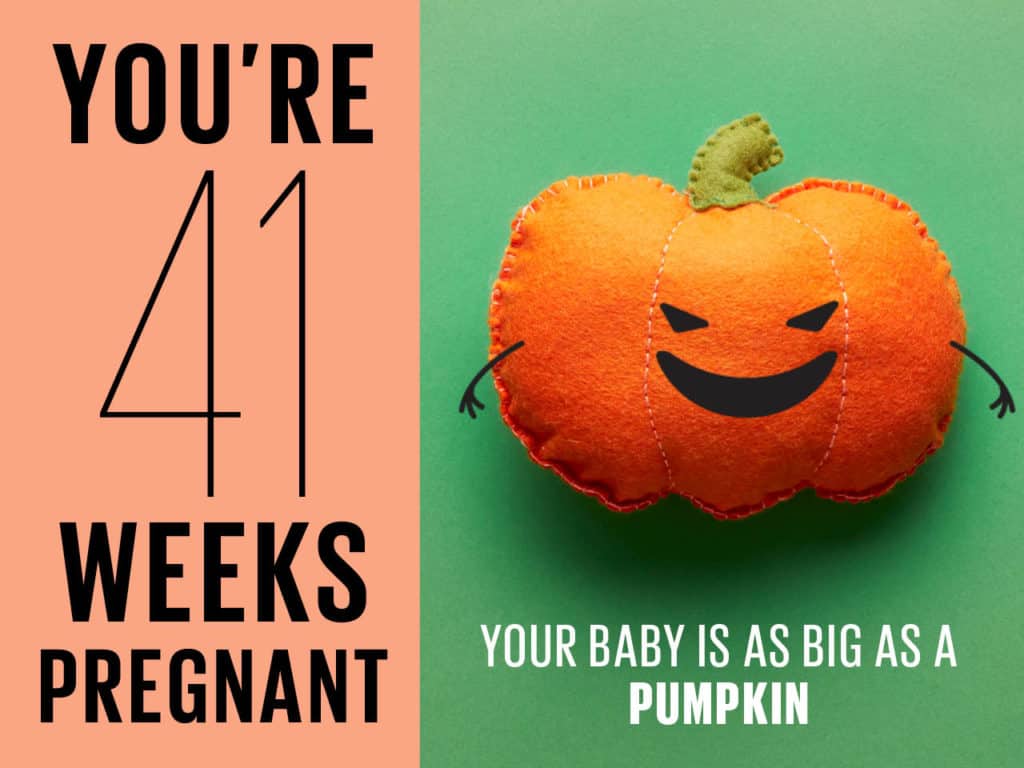
Table of Contents
While your baby’s development and growth curve has plateaued in week 40th you are 41 weeks pregnant already, the baby will still be growing their nails in week 41– don’t lose your patience yet, your little one will be out soon! In the 41st week of pregnancy, your baby would measure 20.4 inches long and weigh right about 7.9 pounds. To put this in perspective, this would be the size of an average Pumpkin.
How Many Months is 41 weeks?
Pregnancy is typically measured in weeks, and a full-term pregnancy is considered to be around 40 weeks. However, 41 weeks in months would be approximately 9 months and 1 week. Keep in mind that a standard month is considered to be around 4 weeks, so the conversion from weeks to months is an approximation. Pregnancy can vary slightly in length for different individuals. So, this is how many months is 41 weeks Pregnant.
So, What Else is Happening to the Baby in the 41 weeks of Pregnant?
Since the baby already is full-grown, there is not much happening except waiting to come out. Apart from the aforementioned growing nails, here is what is happening to your baby when you are 41 weeks pregnant.
1. Baby puts on fat
Your fully grown baby is prepping up to look all chubby and snuggly in their 41st week as they put on more fat before popping out.
2. The baby develops dry skin
When you are 41 weeks pregnant, the baby loses the shiny coating on their body called vernix and their skin starts to dry out.
What Happens to a Mother’s Body When She is 41 Weeks Pregnant?
Here’s what’s happening in the mother’s body around the 41st week of pregnancy-
1. Diarrhea
Diarrhea is a common experience before a mother goes into active labor, which should be right around this time.
2. Frequent urination
Since your baby has now dropped deeper down on the pelvis, expect much more urination. Yup, much more than the ‘more’ you already were experiencing in the last couple of weeks.
3. Bloody show
A bloody show is when your blood vessels rupture and are discharged in the form of blood through the vagina. Bloody show is supposed to be just a couple of spots; if you happen to have a reason that your bleeding is more than spotting, call your doctor ASAP.
4. Nesting
Feeling the urge to clean your house and spend a little longer in your baby’s to-be nursery? This feeling of nesting as the baby’s due date approaches is common. Relish it as long it lasts!
5. Braxton Hicks contractions
The infamous Braxton Hicks contractions can be expected to follow in week 41 from week 40th. Braxton Hicks contractions aka false contractions are your body’s way of preparing you for the labor. You might feel a tightening in your belly as a symptom of Braxton Hicks contractions, however, this tightening will not be too definitive and painful. If it does get to become too painful and too obvious, you might be in your real-deal labor, and it’s time to call your doctor already!
6. Cervical Dilation
In the course of an internal examination, your healthcare provider is likely to inform you about the dilation (opening) and effacement (thinning) of your cervix. This process signifies the preparation of the cervix to facilitate the arrival of your baby. While dilation and effacement can be a gradual progression for some women, taking place over weeks, for others, these changes can occur rapidly, even overnight.
7. Hemorrhoids
Dealing with discomfort from swollen veins in your rectum, commonly known as hemorrhoids? Ease the pain by indulging in a warm sitz bath for 15 to 20 minutes, providing relief to your aching area. Always consult your healthcare provider before considering any medications for hemorrhoids.
8. Pelvic Pain
Experiencing pelvic discomfort as your baby descends toward the birth canal? Alleviate the pressure by lying down and elevating your hips for relaxation.
9. Fetal Activity Changes
Fetal activity may shift during this late stage of pregnancy as babies become more confined in the uterus, making constant kicks and pokes less frequent. While rolls, flutters, and twists should still be felt daily, contact your doctor if there’s a sudden decrease in movement.
41st weeks of pregnancy: What are the signs of labor to look out for?
1. Regular contractions
Unlike the irregular and infrequent Braxton Hicks contractions, when you do get into your actual active labor at week 41st, your contractions would get closer, lengthier, and more intense. Time your contractions as they begin to get more obvious. This will help you determine whether or not they are getting frequent and longer.
2. Your water breaks
Having your water broken is another obvious and common sign of labor. Unlike what it sounds like, water breaking does not appear as a stream of water gushing down your legs, it instead is just a slow trickling down your private parts.
What Would Your Belly Look Like in the 41st Week of Pregnancy?
At the 41st week, a baby is considered late term since most pregnancies deliver at the 39th or the 40th-week mark. However, this is not a warning sign and it is OK – some babies take a little longer and there should be no rush! Your doctor, in the 41st week, however, might recommend a no-stress test and even, perhaps, weekly or bi-weekly ultrasounds just to ensure everything is okay with the baby.
Your belly, obviously, would be full-blown at this time – ready to push the baby anytime now!
Is Induction Necessary in the 41st week of pregnancy?
Medical induction is usually done to avoid birth complications in a baby who may transition from week 41 to week 42 and become a post-term baby from a late-term baby. While some doctors might recommend medical induction with the help of medicines, for a normal and uncomplicated pregnancy, it might not be indispensable. It really should be your doctor’s call at the end of the day because they would be monitoring your and your baby’s health through multiple tests of sorts by now.
If your doctor does suggest induction, feel free, and do not hesitate at all to ask questions until you are sure as the mother. In most cases, the doctors usually recommend induction especially if your cervix has started to ripen (efface and/or dilate) as contractions take place only after ripening of the cervix. If the cervix has not yet started to ripen, you might also be put on some medications to get the ripening going.
Final Thoughts
You are now all set to give birth and though you had so much to hear from so many people about the pregnancy, what happens after childbirth? For the obvious, you will take some time to heal the bodily ailments, regardless you had a vaginal or C-section delivery. You will also, most likely, bleed for a couple of days after childbirth; however, if you have a reason to believe that your bleeding is unusual and that something is wrong with it, reach out to your doctor as soon as possible.
In the case of C-section delivery, you need to be a little more cautious than a natural birth as your stomach was literally cut open to get the baby out. Refrain from lifting heavy items and take walks (even if they are just 10 minutes long) to speed recovery. You might also use a belly band to help your abdominal muscles recover quicker and easier. Also note, after childbirth, your uterus will start contracting back to its original shape and size which will be a painful- ramping experience again.
Over and above everything else, enjoy the life that you have just created, forget the world for a bit, and spend as much time as you can to heal yourself and to take care of your baby!










